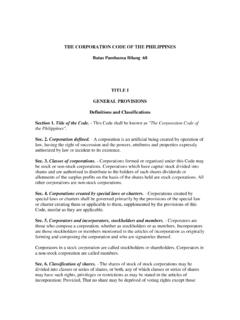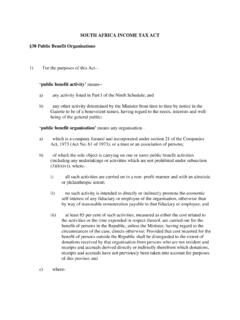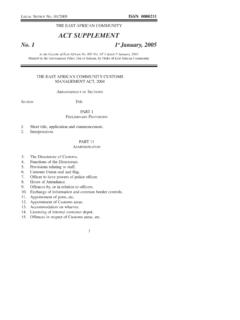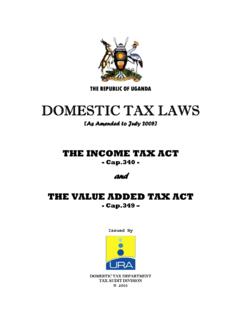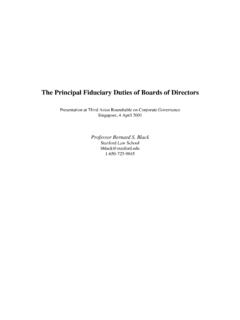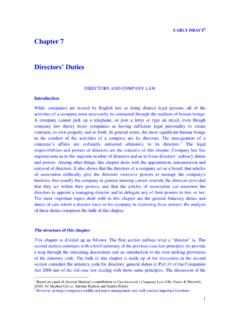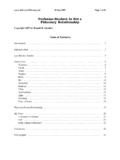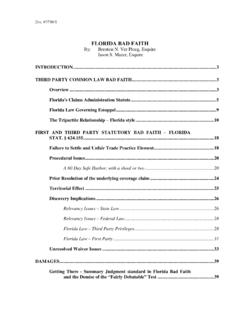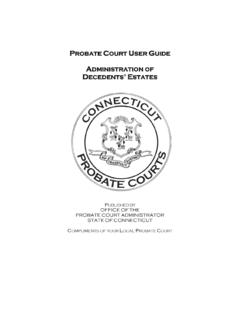Transcription of Exemption Guide - usig.org
1 TaxExemption Guidefor Public Benefit Organisations in South AfricaTax Exemption Guide forPublic Benefit Organisationsin South AfricaThis brochure is a general Guide dealing with the tax Exemption of Public BenefitOrganisations in South fairly comprehensive it does not deal with all the legal detail associated withthe Exemption of Public Benefit Organisations. It therefore, serves the purpose of a Guide only and should not be used as a brochure is based on the legislation as at 22 December you require additional information you may:!Contact your own advisors!Contact the SARS Tax Exemption Unit!Visit the SARS website by:Law AdministrationSARSO riginal date of issue: 30 November 2002 Updated:15 March 2004 ContentsPage1 Introduction_ _ _ _ _ _ _ _ _ _ _ _ _ _ _ _ _ _ _ _ _ _ _ _ _ _ _ _ _ _ _ _ _ _ _ _ _ _ _ _ _ _ _ _ _ _ _ _ _ _ _ _ _ _ _ _ _ _ _ _ _ _ _ _ _ _ _ 12 Background_ _ _ _ _ _ _ _ _ _ _ _ _ _ _ _ _ _ _ _ _ _ _ _ _ _ _ _ _ _ _ _ _ _ _ _ _ _ _ _ _ _ _ _ _ _ _ _ _ _ _ _ _ _ _ _ _ _ _ _ _ _ _ _ _ _ _ 13 Glossary_ _ _ _ _ _ _ _ _ _ _ _ _ _ _ _ _ _ _ _ _ _ _ _ _ _ _ _ _ _ _ _ _ _ _ _ _ _ _ _ _ _ _ _ _ _ _ _ _ _ _ _ _ _ _ _ _ _ _ _ _ _ _ _ _ _ _ _ _ _ _ 14 Income Tax Exemption_ _ _ _ _ _ _ _ _ _ _ _ _ _ _ _ _ _ _ _ _ _ _ _ _ _ _ _ _ _ _ _ _ _ _ _ _ _ _ _ _ _ _ _ _ _ _ _ _ _ _ _ _ _ _ _ _ 25 Qualifying PBOs_ _ _ _ _ _ _ _ _ _ _ _ _ _ _ _ _ _ _ _ _ _ _ _ _ _ _ _ _ _ _ _ _ _ _ _ _ _ _ _ _ _ _ _ _ _ _ _ _ _ _ _ _ _ _ _ _ _ _ _ _ _ _ Benefit Benefit
2 Requirements to be incorporated in founding requirements66 Specific issues in respect of PBOs_ _ _ _ _ _ _ _ _ _ _ _ _ _ _ _ _ _ _ _ _ _ _ _ _ _ _ _ _ _ _ _ _ _ _ _ _ _ _ _ _ _ _ _ _ _ _ Areas / Peace Parks of Loans77 Reporting requirements_ _ _ _ _ _ _ _ _ _ _ _ _ _ _ _ _ _ _ _ _ _ _ _ _ _ _ _ _ _ _ _ _ _ _ _ _ _ _ _ _ _ _ _ _ _ _ _ _ _ _ _ _ _ _ _ tax available to SARS88 Implementation dates_ _ _ _ _ _ _ _ _ _ _ _ _ _ _ _ _ _ _ _ _ _ _ _ _ _ _ _ _ _ _ _ _ _ _ _ _ _ _ _ _ _ _ _ _ _ _ _ _ _ _ _ _ _ _ _ _ _ 89 Transitional Provisions_ _ _ _ _ _ _ _ _ _ _ _ _ _ _ _ _ _ _ _ _ _ _ _ _ _ _ _ _ _ _ _ _ _ _ _ _ _ _ _ _ _ _ _ _ _ _ _ _ _ _ _ _ _ _ _ _ exempt applications810 Group registration_ _ _ _ _ _ _ _ _ _ _ _ _ _ _ _ _ _ _ _ _ _ _ _ _ _ _ _ _ _ _ _ _ _ _ _ _ _ _ _ _ _ _ _ _ _ _ _ _ _ _ _ _ _ _ _ _ _ _ _ _ 811 Tax avoidance / Non-compliance_ _ _ _ _ _ _ _ _ _ _ _ _ _ _ _ _ _ _ _ _ _ _ _ _ _ _ _ _ _ _ _ _ _ _ _ _ _ _ _ _ _ _ _ _ _ _ _ not of approval912 Tax deductibility of Donations_ _ _ _ _ _ _ _ _ _ _ _ _ _ _ _ _ _ _ _ _ _ _ _ _ _ _ _ _ _ _ _ _ _ _ _ _ _ _ _ _ _ _ _ _ _ _ _ _ _ 18A approved of to be in measures of for approval1113 Exemption from other taxes and duties_ _ _ _ _ _ _ _ _ _ _ _ _ _ _ _ _ _ _ _ _ _ _ _ _ _ _ _ _ _ _ _ _ _ _ _ _ _ _ _ _ development Gains Tax1114 Objections and appeals_ _ _ _ _ _ _ _ _ _ _ _ _ _ _ _ _ _ _ _ _ _ _ _ _ _ _ _ _ _ _ _ _ _ _ _ 1115 VAT Implications_ _ _ _ _ _ _ _ _ _ _ _ _ _ _ _ _ _ _ _ _ _ _ _ _ _ _ _ _ _ _ _ _ _ _ _ _ _ _ _ _ _ _ _ _ _ _ _ _ _ _ _ _ _ _ _
3 _ _ _ _ _ _ 1216 Customs and Excise Implications_ _ _ _ _ _ _ _ _ _ _ _ _ _ _ _ _ _ _ _ _ _ _ _ _ _ _ _ _ _ _ _ _ _ _ _ _ _ _ _ _ _ _ _ _ _ _ 12 AnnexuresPageAOther Income Tax Exemptions_ _ _ _ _ _ _ _ _ _ _ _ _ _ _ _ _ _ _ _ _ _ _ _ _ _ _ _ _ _ _ _ _ _ _ _ _ _ _ _ _ _ _ _ _ _ _ _ _ _ 14 BSection 30 Approved PBAs - Extract from Ninth Schedule_ _ _ _ _ _ _ _ _ _ _ _ _ _ _ _ _ _ _ _ _ _ _ _ _ 15 CSection 18A Approved PBAs - Extract from Ninth Schedule_ _ _ _ _ _ _ _ _ _ _ _ _ _ _ _ _ _ _ _ _ _ _ _ 18 DSection 30 of the Income Tax Act_ _ _ _ _ _ _ _ _ _ _ _ _ _ _ _ _ _ _ _ _ _ _ _ _ _ _ _ _ _ _ _ _ _ _ _ _ _ _ _ _ _ _ _ _ _ _ 20 ESection 18A of the Income Tax Act_ _ _ _ _ _ _ _ _ _ _ _ _ _ _ _ _ _ _ _ _ _ _ _ _ _ _ _ _ _ _ _ _ _ _ _ _ _ _ _ _ _ _ _ _ _ 23 FEI1 - Application for Exemption_ _ _ _ _ _ _ _ _ _ _ _ _ _ _ _ _ _ _ _ _ _ _ _ _ _ _ _ _ _ _ _ _ _ _ _ _ _ _ _ _ _ _ _ _ _ _ _ _ 26 GEI2 - Written undertaking_ _ _ _ _ _ _ _ _ _ _ _ _ _ _ _ _ _ _ _ _ _ _ _ _ _ _ _ _ _ _ _ _ _ _ _ _ _ _ _ _ _ _ _ _ _ _ _ _ _ _ _ _ _ 34 HEI3 - Written undertaking (Scholarships, bursaries and awards)_ _ _ _ _ _ _ _ _ _ _ _ _ _ _ _ _ _ _ _ 37 IExample of a Section 18A certificate_ _ _ _ _ _ _ _ _ _ _ _ _ _ _ _ _ _ _ _ _ _ _ _ _ _ _ _ _ _ _ _ _ _ _ _ _ _ _ _ _ _ _ _ _ 39 JRegulations_ _ _ _ _ _ _ _ _ _ _ _ _ _ _ _ _ _ _ _ _ _ _ _ _ _ _ _ _ _ _ _ _ _ _ _ _ _ _ _ _ _ _ _ _ _ _ _ _ _ _ _ _ _ _ _ _ _ _ _ _ _ _ _ _ _ _ 40 KContact details_ _ _ _ _ _ _ _ _ _ _ _ _ _ _ _ _ _ _ _ _ _ _ _ _ _ _ _ _ _ _ _ _ _ _ _ _ _ _ _ _ _ _ _ _ _ _ _ _ _ _ _ _ _ _ _ _ _ _ _ _ _ _ _ 42!
4 1!1 IntroductionThis bro c h u re has been pre p a red to assist non-pro f i torganisations in SA to understand the tax implications affectingthese organisations, with reference specifically to income tax,donations tax, estate duty, transfer duty and the skillsdevelopment levy in light of the recent changes to the IncomeTax Act dealing with public benefit VAT implications affecting these organisations are notdiscussed in detail. A brief summary is included. A separatebrochure dealing with this aspect is available from your localSARS office or on the SARS website. Non-profit organisations have a significant role to play in societyas they accept responsibility for the social and developmentneeds of the country thereby relieving the financial burden,which otherwise falls on the State.
5 Tax benefits are designed toassist non-profit organisations with resources and an enablingenvironment in which to achieve their objectives. Even if an organisation has a non-profit motive it does not meanthat it is automatically exempt from the payment of income organisation will, however, only be exempt from income andrelated taxes if it complies with the relevant requirements andconditions as set out in the Tax n t e rn a t i o n a l l y, non-profit organisations are granted somedegree of preferential tax treatment and donor incentives,although the eligibility, criteria and available benefits differ fromcountry to country. In SA, religious, charitable and educationalinstitutions of a public character were traditionally exempt fromincome and related taxes. In the absence of comprehensive case law and statutorydefinitions, the Commissioner was burdened with theinterpretation and implementation of these provisions and oftenunable to accommodate worthy organisations because theiractivities did not fall within the letter of the Act.
6 Following recommendations by the Katz-Commission, theMinister of Finance, in his 2000 Budget Speech, announcedwide-ranging changes to the legislation regulating the incometax Exemption of non-profit organisations. The objective of thenew legislation was to cluster certain types of entities togetherand treat them uniformly and to provide more certainty totaxpayers and the Commissioner on the qualifying requirementsof tax exempt entities. The Taxation Laws Amendment Act, No30 of 2000, introduced the new concept of a public benefitorganisation carrying on a public benefit activity. The Minister may expand the list of public benefit activities bynotice in the Gazette. The new provisions are more objectivewhich will result in more certainty. The new provisions alsoinclude specific sanction measures if an Exemption is misused.
7 A special dedicated office (Tax Exemption Unit) has beenestablished to deal with the applications for Exemption and theannual assessment of exempt organisations to ensure specialisedand uniform treatment, and assist in the prevention of list of organisations authorised to issue tax certificatesentitling donors to a tax deduction was also broadened, and thequalifying threshold for individuals was increased from 2% to 5%to bring it in line with companies. (See Chapter 12 - TaxDeductibility of Donations)3 GlossaryActIncome Tax Act, 1962 (Act No. 58 of 1962 as amended)CommissionerCommissioner for SARSCo-ordinating bodyThe regulating or co-ordinating body of a group of organisationssharing the same objectives and minimis ruleMonetary exception threshold to the prohibition on trade if aPBO carries on trade on a limited TaxTax levied at 20% on a donor on the value of property disposedof under a donation.
8 (Levied in terms of Section 54 of the Act).Estate dutyDuty payable on the dutiable amount of an estate of a deceasedperson at a rate of 20%. (Payable in terms of the Estate Duty Act, of 1955).FiduciaryA person who holds a position of trust or documentThe written document establishing the organisation such as thememorandum and articles of association, a constitution or a trustdeed. Income and related taxes and dutiesIncome tax, donations tax, estate duty, transfer duty, stamp dutyand skills development of benefit and NeedyImpoverished, having little means and few possessions andtherefore in need of basic necessities and Benefit Activity Any activity listed in Part 1 of the Ninth Schedule to the Act (SeeA n n e x u re B) and any other activity determined by the Minister ofFinance by notice in the Gazette to be of a benevolent nature havingre g a rd to the needs, interests and well-being of the general Benefit OrganisationAny organisation which is a company incorporated under section21 of the Companies Act, a trust or an association of personscarrying on a public benefit activity and complying with theprovisions of section 30 of the Act (See Chapter 5).
9 PBOP ublic benefit organisationSARSThe South African Revenue ServiceSection 10(1)(cN) of the ActSection granting Exemption from income tax to qualifying public!2!benefit 18A of the ActSection providing for the tax deductibility of donations made toc e rtain approved public benefit organisations, institutions,boards or bodies, or the government, provincial administrationsor local authorities, carrying on certain approved activities aslisted in Part II of the Ninth Schedule to the Act (see Annexure C).Section 18A receipts Receipts issued to donors in terms of section 18A of the Actentitling the donors to a tax 30 of the ActSection detailing the conditions and re q u i rements to becomplied with to be approved as a DutyDuty payable on the transfer of property in terms of the TransferDuty Act No.
10 40 of tax exemptionPreferential tax treatment is granted to non-profit organisationsestablished for the benefit of the general public. However, thispreferential treatment will only be available to organisationscomplying with the provisions of the Act and related legislation,both on application for Exemption from taxes and duties, andduring the existence of the organisation. This brochure deals mainly with the requirements relevant topublic benefit organisations which will apply to the majority ofnon- profit organisations qualifying for income tax and relatedexemptions. A summary of other exempt organisations isprovided in Annexure are exempt from income tax in terms of section 10(1)(cN)of the Act. The requirements to qualify for this Exemption aredetailed in section 30. A p p roved PBOs there f o re enjoy the benefit of spending publicfunds which they generate, whether from the general public orthe state, on a tax free basis.



